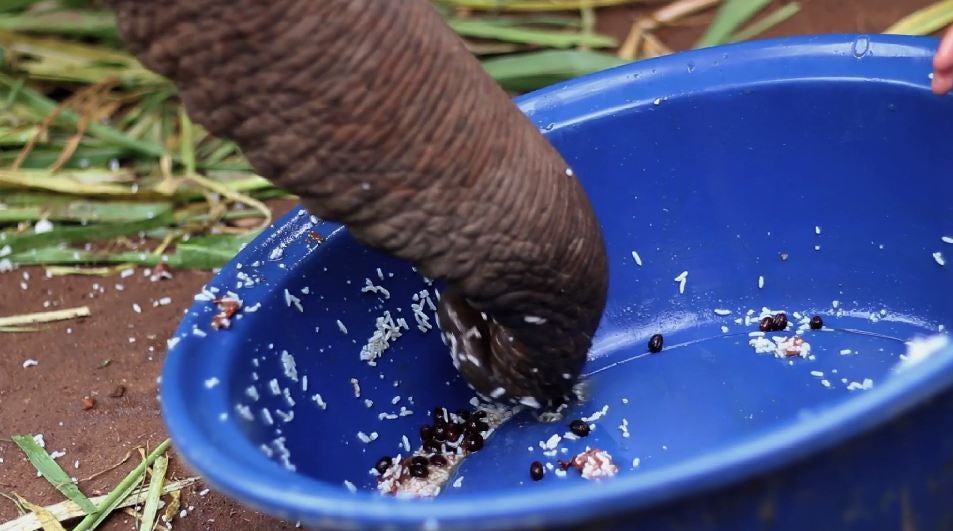The Independent's journalism is supported by our readers. When you purchase through links on our site, we may earn commission.
World's most expensive coffee? Black Ivory Coffee uses beans ingested by elephants
The firm says it has created the "rarest" coffee in the world using beans consumed by elephants in northern Thailand

Civets have had their day as the mammal behind the world’s most expensive coffee – that accolade now reportedly goes to Thai elephants, the latest animal whose internal systems are being utilised for coffee production.
Black Ivory Coffee and its creator Blake Dinkin is keen to stress the community and conservation benefits of this new delicacy, in which rescued street elephants in Chiang Saen, northern Thailand, consume Arabica coffee beans.
The beans are picked from an altitude “as high as 1,500m” before the animals, from the Golden Triangle Asian Elephant Foundation, have them pass through their systems for 15-70 hours.
Once deposited within excrement, the beans are picked from the waste by mahouts and their families, to be sundried and roasted, with the beans’ bitterness quelled by the fermentation process.
Black Ivory calls itself the “rarest and most expensive” coffee in the world. A statement on its website reads: “Approximately 8,800 beans are picked for each kilogram of roasted coffee; thus, 33 kilograms of coffee cherries are required to produce just one kilogram of Black Ivory Coffee.”
Similarly-produced civet coffee – also named Kopi Luwak – grew in popularity through the Noughties and a kilogram can be bought on coffee websites in packages in excess of £280.
That trade, in which cat-like Indonesian palm civets consume coffee berries, has been dogged by claims of animal abuse and a market flooded with fakes.
It even led to the man who introduced civet coffee to the West, condemning it and calling for its abolition.
“I feel as if long ago I must have inadvertently put my finger on the pulse of some monstrous zeitgeist, a grotesque cancer that constantly mutates into yet more vile and virulent forms,” Tony Wild wrote in The Guardian last year.
Black Ivory Coffee from Duane Lee Wo on Vimeo.
“I'm fully expecting celebrity-digested designer crap coffee to be next down the line.”
Mr Dinkin, 44, however, says his creation is sustainable: “There's easier ways to make money,” he told NPR.
“I wouldn't spend 10 years and put my life savings on this if I didn't think it's for real, or I thought it was just going to be an overnight gag.”
His website states that eight per cent of the coffee sales will help to “fund a specialist elephant veterinarian to provide free care to all the elephants of Thailand through the Golden Triangle Asian Elephant Foundation”, as well as help to purchase medicine and a new laboratory.
“Fermentation is great for things like wine or beer or coffee, because it brings out the sugar in the bean, and it helps impart the fruit from the coffee pulp into the bean,” Mr Dinkin said.
“I want people to taste the bean, not just the roast. The aroma is floral and chocolate; the taste is chocolate malt with a bit of cherry; there's no bitterness; and it's very soft, like tea. So it's kind of like a cross between coffee and tea,” he added.
The firm is looking to produce 200kilograms in 2014, which will be brewed in a machine dating back to 1840 France.
John Roberts, Director of the Golden Triangle Asian Elephant Foundation, said: “As long as we could prove that there was no caffeine or anything else harmful leaking out, then it was worth trying, at least.
“It's not necessarily elephants getting buzzed that I'm too worried about, it's elephants missing their caffeine fix and having headaches and being bad-tempered... It's very dangerous. The last thing you want is a cranky elephant.”
It can currently be bought in a number of five-star hotels including Banyan Tree Macau and is used in a body scrub at the The Peninsula Bangkok Spa.
Join our commenting forum
Join thought-provoking conversations, follow other Independent readers and see their replies
Comments